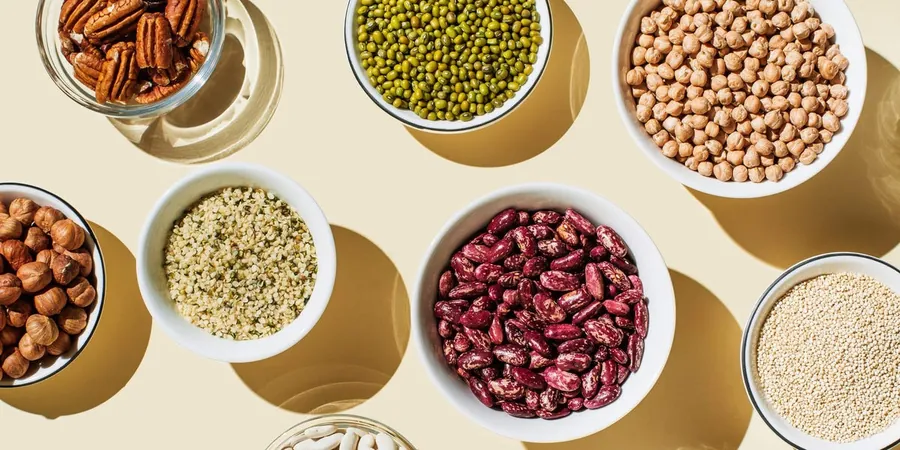
Why a Leading Nutrition Scientist Says Fiber is the Unsung Hero of Your Diet Over Protein
2025-01-08
Author: Ken Lee
In a groundbreaking statement, Tim Spector, a prominent nutrition scientist and co-founder of the nutrition company Zoe, emphasizes the importance of fiber in our diets, suggesting that most individuals are already meeting their protein needs but are woefully lacking in fiber intake.
Spector’s assertion is particularly striking considering that more than 90% of women and 97% of men in the U.S. fail to reach the recommended daily intake of dietary fiber, as noted in the USDA’s Dietary Guidelines for Americans for 2020 to 2025. Despite the surge in high-protein products lining grocery store shelves, Spector argues that fiber should take precedence in our dietary focus.
The Power of Fiber
Fiber is not just a trendy dietary buzzword; it has vital health benefits ranging from bolstering gut health to improving heart function and alleviating constipation. Thus, Spector advocates for individuals to transition from meat-centric diets to a variety of plant-based options rich in fiber, such as beans, lentils, and whole grains.
In his interview with Business Insider, he highlights that he personally consumes about 1 gram of protein per kilogram of body weight primarily derived from plant sources. For instance, 100 grams of fried tofu delivers 18 grams of protein paired with 4 grams of fiber, while lean chicken provides 22 grams of protein but lacks any fiber—demonstrating that plant-based options can deliver both protein and fiber, ultimately fostering better health.
Three Simple Tips to Boost Fiber While Meeting Protein Needs
1. **Prioritize Plant-Based Protein Sources**: Legumes like beans, lentils, and chickpeas can be excellent substitutes for meat. Canned chickpeas, for instance, offer 8 grams of protein and 7 grams of fiber per 100 grams, making them not only nutritious but also cost-effective when compared to meat.
2. **Embrace Variety**: Due to the lesser protein content in plant foods, Spector recommends incorporating a diverse array of plant-based proteins throughout the day. A typical breakfast might include yogurt, berries, nuts, and seeds, which can collectively provide around 30 grams of protein. Rotating different legumes and grains over meals can ensure you meet protein objectives while enjoying fiber's myriad benefits.
3. **Small Additions Matter**: Incorporating protein-rich snacks like hemp seeds or almond butter can infuse meals with extra nutrition. For instance, 100 grams of hemp seeds contains a staggering 31 grams of protein and 4 grams of fiber, making it a powerful supplement to any dish.
The Fiber Revolution: Why It Matters
As society becomes increasingly focused on protein consumption, it’s crucial to strike a balance by not neglecting fiber. Increasing our fiber intake through plant-based foods can not only satisfy protein needs but also promote long-term health and sustainability.
Given the environmental impact of meat production, choosing fiber-rich options like legumes not only supports personal health but also contributes to a greener planet.
As experts like Tim Spector continue to advocate for this shift, it’s clear the fiber revolution is here to stay. Are you ready to join the movement towards a more nutritious and sustainable diet? Don’t be left behind—start making those fiber-rich choices today!

 Brasil (PT)
Brasil (PT)
 Canada (EN)
Canada (EN)
 Chile (ES)
Chile (ES)
 Česko (CS)
Česko (CS)
 대한민국 (KO)
대한민국 (KO)
 España (ES)
España (ES)
 France (FR)
France (FR)
 Hong Kong (EN)
Hong Kong (EN)
 Italia (IT)
Italia (IT)
 日本 (JA)
日本 (JA)
 Magyarország (HU)
Magyarország (HU)
 Norge (NO)
Norge (NO)
 Polska (PL)
Polska (PL)
 Schweiz (DE)
Schweiz (DE)
 Singapore (EN)
Singapore (EN)
 Sverige (SV)
Sverige (SV)
 Suomi (FI)
Suomi (FI)
 Türkiye (TR)
Türkiye (TR)
 الإمارات العربية المتحدة (AR)
الإمارات العربية المتحدة (AR)